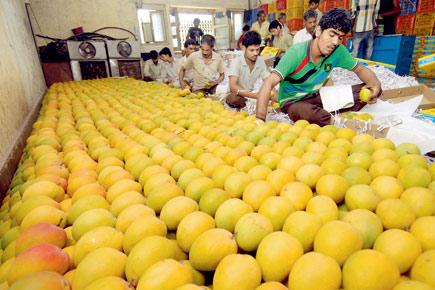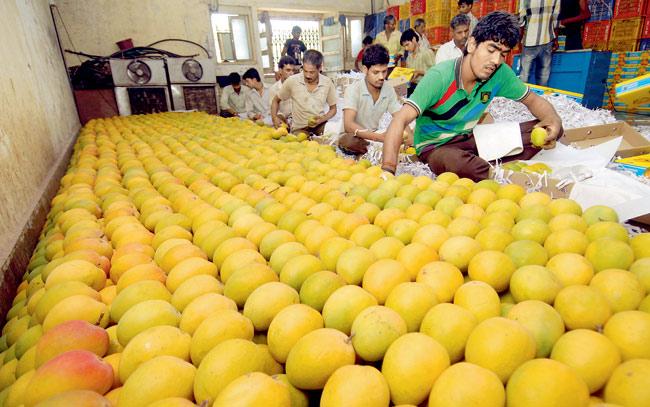The state's famed and much-loved Alphonso mangoes have just started arriving at the stands, but traders say the supply of the fruit will be lower this year

The Alphonso is late. By a whole month almost. And if the buzz among traders is to be believed, then the much-loved Hapoos will play harder to get this year. Currently between 500 and 1000 boxes of the fruit are coming in to Vashi’s Agricultural Produce and Marketing Committee (APMC) market every day, but traders say this is the quantity they usually receive by the end of January and that by March the flow of mangoes is supposed to increase. So what’s wrong with the king?
ADVERTISEMENT

Currently 500-1,000 boxes of mangoes are coming in to Vashi’s Agricultural Produce and Marketing Committee (APMC) market every day, which is usually the quantity that comes in every year at the end of January. File Pic
First flowering delayed
The first flowering of the fruit, which takes place during October-November every year, suffered this year due to a sudden drop in temperatures. Mangesh Shinde, a wholesale trader at APMC market said, “The relatively cold climate caused increased ‘dropping’ of the flowers. Only the second flowering sustained and the fruits, which came out of it have now started to enter the market. The earlier batch suffered badly.”
Skewed sex ratio
Besides, due to the shedding of flowers, there were less of female flowering. “It is the female flowers, which generally turn into fruits. Male flowers are useless. That is one more reason why the quantity is low so far this year,” said Sanjay Pansare, director of the APMC fruit market. He added that mangoes do not grow on all the branches because of this skewed sex ratio.
Pest infestation
An increased occurrence of pests such as hoppers and thrips have been observed this year, say experts and this has damaged the fruits and caused early dropping of the fruit. Abhimanyu Mane, Horticulture Development Officer at APMC said, “Fungal growth has been observed on many fruits and black spots seen either over the fruit or on the branches. In most cases it is seen that if the pest attacks the plant then there is preliminary dropping and proper mango setting does not occur.”
Size and side effects
Traders claim the size of the fruit presently entering the market is also significantly smaller than usual. Compared to last year when the size of the mango was anywhere between 200-350 gm each, this year most of the fruits are 200 gm or less.
The quality is poorer, and the trademark golden shine is missing as of now.
Traders however, say they are hopeful that as the subsequent batches start coming in, the quality would be good.
 Subscribe today by clicking the link and stay updated with the latest news!" Click here!
Subscribe today by clicking the link and stay updated with the latest news!" Click here!






